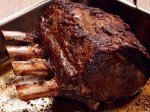None of this stuff about meat being an essential part of the human diet is true. In fact, there are more studies than enough that show eating large quantities of meat only became normal for humans around the time of the advent of farming and growing crops like wheat and barley (which humans used to use as currency).
Glucose (as mentioned in one of the above posts, as BenFTW pointed out) is a simple sugar that the body can get from any carbohydrates or fats. Glocuse, out of all the natural foods humans eat, is most readily found in fruits (although nowadays it's most readily found in Snickers bars and sugar cubes, sadly). As for what is essential to the human body, I have a list:
Oxygen (from the air)
Nitrogen (from the air)
Water
Calcium
Magnesium
Zinc
Iron
Vitamins A, B1 - B12 (B12 being the often cited "essential vitamin from meat", which is actually false. Vitamin B12 is synthesized in the digestive tract by bacteria, and is found in seaweed, fungi [like mushrooms], brown rice, and many vegetables), C, D (from sunlight), E, Vitamin F (Omega 6), Vitamin G (or riboflavin, which is actually part of the vitamin B group, but anyway), Vitamin H (biotin), Vitamin J (choline), Vitamin K, Vitamin M (again another B group vitamin, called folic acid).
Amino acids (or proteins)
Non-synthesizable fatty acids (eicasonoids, endocannibinoids, lipoxins, eisofurans, neurofurans, hepoxilines etc)
Potassium
Sulfur
Phosphorus
Sodium
Chlorine
And in extremely small amounts:
Boron (from the air, mostly)
Chromium
Copper
Flourine
Iodine
Manganese
Molybdenum
Selenium
Silicon
Tin
and Vanadium
And actually, fruits and nuts (the diet of most primates), as a collective group of foods, are the only foods from which every single one of these nutrients can be taken. Meat is a dense source of energy, yes, and we can digest it, but our flat molars, long digestive tracts, relatively high food intake needs in proportion to body mass when compared with carnivorous animals like cats, our lack of natural predatory instinct (like, again, cats, who hunt as kittens), and our natural emotional affinity with other mammals indicate that we are not made to eat high quantities of meat.
In fact, if you look at the American diet, it consists of a lot of refined sugar (without the fibrous material of fruits), relatively low green intakes, a huge vitamin deficiency problem and an abnormally high meat content, and of course lots of fat. America is at present the most obese nation on Earth (coronary heart disease is by far the biggest killer in the US). Contrast that with India, which is a predominantly vegetarian society, who have one of the lowest obesity rates on Earth. You are about twice as likely to develop coronary heart disease in America as you are in India. Unfortunately India is also a society with one of the highest infectious disease rates (it's basically a tropical country), one of the highest wealth disparities, highest numbers of unvaccinated children, largest smog problems, and highest poverty rates, so their life expectancy is somewhat less than an American's (the 3rd, 4th, 5th, 6th and 7th biggest killers in India are lung disease, diarrhoea, influenza/pneumonia, low birth weight and tuberculosis respectively).
Anyway, recent studies carried out in developed countries have shown that two people in the same culture, one who eats a significant amount of meat, and another who is on a fully nutritious vegetarian diet, will live different lengths. The average result was that a vegetarian woman would live about 5 years longer than the meat eating woman, and the vegetarian man would live about 7 years longer than the meat eating man.
With all that said, I eat meat.

